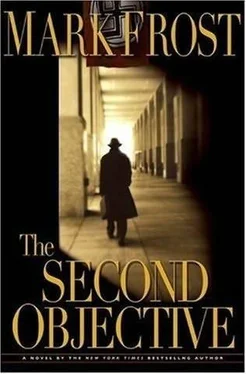“He said there were five squads, but I only saw four.”
“Not the whole commando unit?”
“No, no, it was a small group. Four squads, four men apiece. How many are left?”
“Not counting you,” said Grannit, “one.”
“One squad?”
“Just him.”
Grannit took out the keys to the jeep. Bernie could see he was thinking about tossing them to him, telling him to drive it around. He could also see that Grannit knew that he knew that Grannit was thinking about it. Grannit put the keys back in his pocket and tossed away the cigarette.
“Paris,” he said.
Versailles
DECEMBER 19
General Eisenhower returned to Allied headquarters after his meeting at Verdun, and the jaws of the security detail protecting him from Skorzeny’s assassins snapped shut. He would not be allowed to leave his heavily defended compound again.
For the first time that morning headlines about the “Battle of the Bulge” appeared in American newspapers, and it quickly became the catchphrase for the entire Ardennes offensive. As the American front continued to deteriorate, Eisenhower made a controversial decision to place Field Marshal Bernard Montgomery in charge of the northern half of the battlefield. In doing so, he transferred authority over two American army groups that had long served under General Bradley to the one British officer almost universally disliked by the American senior staff. Unable to communicate with his generals in that part of the field, Bradley had his hands full holding the southern half of the Ardennes until Patton arrived. Still, Bradley reacted furiously to the perceived slap at his performance and tried to tender his resignation. Eisenhower refused it, arguing that the Germans had surrounded the American divisions in Bastogne. The fight was entering its most critical hours, and Bradley was his man.
Bradley had until recently, and for years prior, been Eisenhower’s superior officer, so this loss of command was a bitter pill to swallow, particularly since he knew Ike shared his antipathy for Montgomery. When Bradley agreed to stay on, as a show of gratitude Eisenhower made arrangements for him to receive his fourth star. Although Montgomery conducted his new command effectively, conflicts that resulted between the senior staffs of the Allies nearly achieved Hitler’s objective of tearing their delicate alliance apart. Throughout, Eisenhower maintained his unearthly composure, kept Montgomery in check, and held these two armies together by force of will and his own quiet decency.
Three hours before daylight on December 21, the 150th Panzer Brigade finally entered the Battle of the Bulge under the command of Otto Skorzeny. Realizing that Operation Greif ’s plan to capture the bridges at the Meuse would never materialize, Skorzeny volunteered his brigade for a frontal assault to capture the key city of Malmédy, where the Allies had mounted a makeshift but tenacious defense. His ten tanks, German Panthers disguised as American Shermans, led the attack from the southwest. They did not enjoy the benefit of surprise; an attack in the Ardennes by a German force dressed as Americans had been anticipated for days. As the tanks approached, they set off trip wires that flooded the night sky with flares. Under the artificial light, American guns entrenched on the far side of a stream opened fire and destroyed four of the tanks. Two more were taken out as they forded the stream. By dawn and into the early afternoon, rallied by Skorzeny’s leadership, the brigade fought its way into the outskirts of town, defended primarily by the 291st Combat Engineers. When two companies of American infantry arrived to reinforce them, Skorzeny assessed his precarious position from a hill overlooking the field and reluctantly ordered his brigade to retreat. None of his tanks and less than half of his infantry survived.
That night, while approaching German divisional headquarters near Ligneuville to make his report, Skorzeny’s armored car was blown into a ditch by a barrage of American artillery shells. Skorzeny was thrown from the car. Shell fragments peppered him in the legs, and a splinter the size of a small pencil pierced his forehead above the right eye. It caused heavy bleeding and carved off a flap of dangling flesh that impaired his vision. Taken to headquarters for treatment, he refused anesthetics and the doctor’s recommendation that he be moved to a hospital for surgery, demanding that they stitch his forehead together so he could return to the field. He would command his remaining troops in a variety of actions for two more days before infection set in around the wound that nearly blinded him and forced his evacuation to a German hospital.
The Ardennes offensive, so far as Otto Skorzeny and what was left of his 150th Panzer Brigade were concerned, was effectively over.
Paris, France
DECEMBER 20
The City of Light had turned dark and cold. While the Allies’ Liberation of Paris in August raised the spirits of those who had endured the German occupation, the early success of the Ardennes offensive leveled them in a single chilling blow. Amid wild rumors that circulated in the absence of hard news, the specter of Nazi columns marching back in along the Champs Élysées seemed all too easy to envision. Thousands of returning civilians who had just begun to reestablish their lives fled again in panic.
For those who remained, on the eve of what would be remembered as the coldest Parisian winter in modern memory, there was little fuel to heat their apartments and almost no food beyond the barest necessities to put on their table. Unstable gas lines resulted in random explosions that killed dozens every week. Curfews and blackouts, already in place but enforced more rigorously once fighting in the Ardennes began, emptied the streets. The power grid failed at least twice a night and the deep darkness provided cover for a campaign of terror, as the Free French who had resisted the Nazis during occupation took revenge against collaborators. Only two months in office, General Charles de Gaulle’s provisional French government clashed repeatedly with the Allied high command, which retained de facto control of Paris as a war zone, and their conflicts strangled the flow of essential goods and services. Anyone with means who sought to remedy their personal or house hold shortages had no alternative but to traffic in black-market goods.
Every block on every street in every arrondissement produced a broker, someone who knew someone who could connect him to the rising tide of illicit goods that flooded the city like an invisible sea. Enterprising citizens traveled back and forth by train to Normandy, returning with suitcases full of Spanish hams, wheels of English cheese, sacks of coffee from Morocco. Whether you were a GI looking to sell his daily ration of cigarettes to a man hawking Lucky Strikes outside the St. Denis Metro station, or a star chef trying to score a hundred pounds of veal for a three-star restaurant on the Rue Royale, the deal could be done if you greased the right wheels. In the Darwinian ecosystem that had sprouted up overnight to meet those demands, ruthlessness and amorality guaranteed success.
Montmartre, Paris
DECEMBER 20
As regular as banker’s hours, the man known only as Ververt spent every night from eight P.M. to two A.M. at a table near the kitchen of a jazz club he owned on Rue Clichy at the foot of Montmartre. He chain-smoked cigarettes, nursed one milky glass of pastis each hour, and kept an eye trained to oversee the action on the floor. A squadron of underlings ran interference, screening every supplicant who asked for an audience with their boss. Most problems or requests they were able to handle, but occasionally something crossed the door that warranted Ververt’s personal attention. Like the two thousand in American cash sitting on the table in front of him.
Читать дальше












